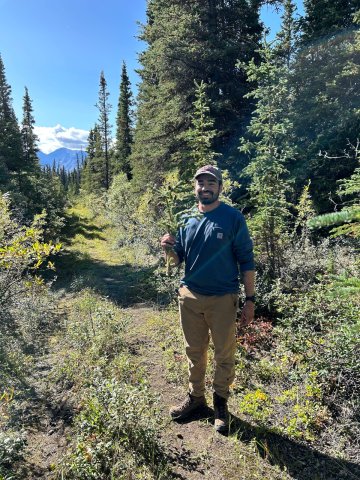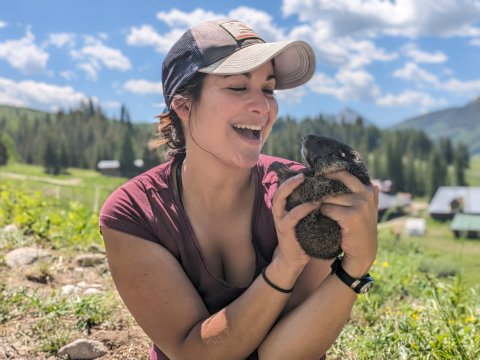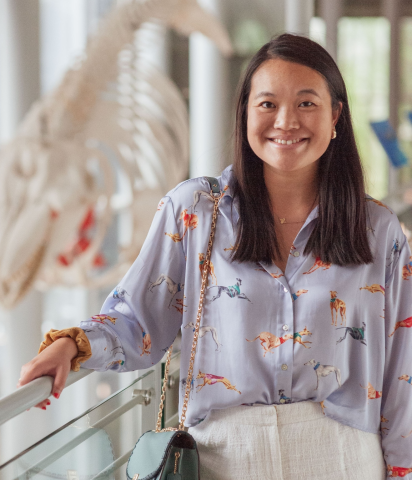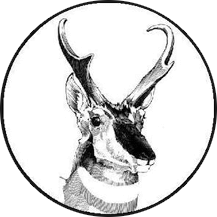Guy N. Cameron Rodent Research Award
About the Committee
Chair
- Enrique Lessa (CameronAward@mammalsociety.org)
Members
|
|
History and Mission
The Cameron Award supports graduate and postdoctoral research on the ecology or behavior of rodents native to the New World (North, Central, South America), with an emphasis on (1) field research or (2) laboratory research that supports or augments field research. See the “Grants & Awards” tab for further details. A single award of $5,000 is available annually to qualified students enrolled in a MS or PhD program in the United States, and a second $5,000 award is available to qualified postdoctoral researchers employed in the United States. The nationality of the applicant is not considered in reviewing applications. Applicants must be current ASM members and must maintain their membership for the duration of the award.
The Cameron Award was established in 2019 with a substantial gift by Guy N. Cameron to the ASM. The name of this award was proposed by ASM President Kelt and Secretary-Treasurer Hopton and approved by the ASM Board of Directors.
2024 Cameron Award Recipients
The Cameron Award supports graduate and postdoctoral research on the ecology or behavior of rodents native to the New World, with an emphasis on (1) field research or (2) laboratory research that supports or augments field research. The 2024 graduate student recipient of the Cameron Award is John Paul Williams-Soriano and the 2024 postdoctoral scientist recipient is Dr. Sonja Wild.
|
Image
 |
John Paul Williams-Soriano is a PhD candidate working with Dr. Ben Dantzer’s lab at the University of Michigan where he is primarily interested in understanding how plant defense compounds mediate ecological relationships and influence broader population dynamics. He addresses these questions in collaboration with the Kluane Red Squirrel Project, a long-term field study on the ecology, evolution, and physiology of North American red squirrels (Tamiasciurus hudsonicus) and their coevolutionary relationship with white spruce trees (Picea glauca). Specifically, John Paul studies how red squirrels respond to fluctuating food availability from white spruce trees that produce synchronous seed pulses every 3-7 years. Red squirrels anticipate these resource pulses and mount behavioral and reproductive changes prior to new seed availability, however, the cue which induces these phenotypes in red squirrels is unknown. John Paul measures reproductive hormone metabolites in red squirrels and uses chemical ecology techniques on white spruce tissues to understand how hormonally active plant compounds might influence red squirrel physiology and behavior. By addressing both sides of this relationship, John Paul aims to further understand how animals respond to changing environments and how species interactions are affected by global climate change. |
|
Image
 |
Dr. Sonja Wild received her PhD in Biology from the University of Leeds (UK) in 2019 and is currently a Postdoctoral Research Fellow at the University of California Davis on a Mobility Fellowship granted by the Swiss National Science Foundation. Broadly, her research aims to uncover the mechanisms underlying behavioral plasticity in free-ranging social animals. She is particularly interested in social learning phenomena, individual decision-making processes, and the fitness outcomes of behavioral variation on an individual- and population-level. Her previous research on dolphins and songbirds has received considerable attention within the scientific community and been covered by a range of local and global media, often featuring her wildlife photography and videography. During her current postdoc in collaboration with Dr. Jennifer Smith (University of Wisconsin-Eau Claire) and Dr. Andrew Sih (UC Davis), and with the financial support from the Cameron Award, Sonja takes a mechanistic approach to uncover how human disturbance impacts social network structure and learning strategies in California ground squirrels. As co-leader of the ‘Long-term Behavioral Ecology Study on California Ground Squirrels’ at Briones Regional Park in California, established by Dr Jennifer Smith in 2013, she is passionate about providing hands-on research opportunities and mentorship to undergraduate students in Biology, thereby actively helping to train the next generation of scientist. |
Donate Now!
You can donate to the Guy N. Cameron Rodent Research Award fund (and others) here.
Reports
Grants & Awards
Research that may be funded by the Cameron Award.
The purpose of the Cameron Award is to fund field research on native rodents. In some cases, laboratory research may enhance field research or may explain findings of field research. If both field and laboratory research is proposed, applicants must describe how laboratory studies will augment or enhance field studies. Laboratory studies per se will not be supported. The type of research to be supported is broad, generally falling under the umbrella of ecology and behavior. Potential research themes include but are not limited to the following:
- ecology (e.g., abundance, habitat use, diet, inter- or intraspecific competition);
- reproduction and development;
- physiology, nutritional ecology, metabolism, hibernation, estivation;
- behavior (e.g., mating behavior, movement/dispersal/ home range, territoriality, communication [scents and odors]);
- impact on habitats (e.g., burrows, runways, dams, tunnels, foraging);
- impact on other animals (e.g., prey, predators, competition, mutualism);
- impact of diseases;
- conservation or management issues (e.g., impact of habitat destruction/habitat alternation, introduced non-native animals, fossil fuel extraction, chemicals released by industries, wind farms).
Research projects conducted anywhere in North, Central, or South America may be supported by the Cameron Award.
How can funds from the new research award be used?
Funds may be used for field or laboratory supplies or equipment, and for travel to or housing at study sites. Salary and travel to meetings will not be supported.
Application requirements and instructions
Applicants must submit a research proposal, limited to five double-spaced pages (12 point Times New Roman font, full 1” margins). The proposal must include a description of the thesis, dissertation, or postdoctoral research project organized under the following headings: Title, name, and affiliation of the applicant; Introduction, including questions/hypotheses to be addressed; Objectives; Methods, including where the research will take place, and noting whether permission has been granted to use study sites; Preliminary results of the research, if applicable; Duration of the research to be supported by the Cameron Award and the expected completion date for the project; Significance of the research and Expected results; How the proposed research fits the purpose of the Cameron Award; and Literature Cited (which may be on a separate page, independent of the 5-page limit).
A detailed budget is required, as is a separate justification (1 page maximum) of the funds requested to support the research (these are independent of the 5-page limit for the proposal). Any other grant support for the proposed research should be noted. The applicant’s CV (3-page limit) should include: education, past or current research projects, past research support, any other requested support for the research project under consideration by the Cameron Award, and a list of publications and presentations of research efforts (if any) at annual society meetings. A recommendation letter from the Major Professor (for student applicants) or Postdoctoral Mentor (for postdoctoral applicants) is required, and should indicate why this application should be supported by the Cameron Award; the letter should also indicate how the proposed projects fits into the applicant’s overall research effort. The letter will be submitted separately from the application and instructions will be provided to the writer by email.
See the grants page for current submission dates.
Recipients
Recent Awardees
2023 Cameron Award Recipients
The Cameron Award supports graduate and postdoctoral research on the ecology or behavior of rodents native to the New World, with an emphasis on (1) field research or (2) laboratory research that supports or augments field research. The 2023 graduate student recipient of the Cameron Award is Xochitl Ortiz-Ross and the 2023 postdoctoral scientist recipient is Dr. Nikki Lee.
|
Image
 |
Xochitl Ortiz-Ross is a Ph.D. candidate working with Dan Blumstein in the Ecology and Evolutionary Biology department at UCLA. Her interest in behavioral ecology spans across taxa, from glass frogs to scrub-jays, to her current study animal—yellow-bellied marmots (Marmota flaviventris). She is interested in the ecological, behavioral, and evolutionary consequences of early environmental experiences and their potential role in conservation. Her dissertation work focuses on the cumulative impact of multiple early life stressors, for which she has developed a novel framework that repurposes and adapts established methods from the human literature (cumulative adversity indices). Her research relies on decades of individual data collected on multiple generations of yellow-bellied marmot at the Rocky Mountain Biological Laboratory, in Gothic, Colorado. Yellow-bellied marmots are a particularly interesting study system as they span a large elevation range and, since they hibernate for half of the year, their biology is closely tied to phenology and its environmental consequences. The Cameron Award supports her third year of research which focuses on the impact of early adversity on the life-history and reproductive decisions of female yellow-bellied marmots. While in the field, Xochitl is also committed to increasing diversity, equity, and inclusion in field-based science. She has developed several workshops addressing identity-based field safety, inclusive mentorship, and boosting self-confidence by conquering goals and adopting a growth mindset. |
|
Image
 |
Dr. Nikki Lee is currently an NSF Postdoctoral Fellow in the lab of Dr. Eileen Lacey at the University of California, Berkeley. She graduated from Cornell University in 2015 with degrees in Biology and English. In 2021, she received her PhD in Neuroscience and Behavior from the University of Massachusetts Amherst, in the lab of Dr. Annaliese Beery at Smith College, with a dissertation focused on the roles of reward and dopamine signaling in prairie vole peer relationships. She was then a Consortium for Faculty Diversity Postdoctoral Fellow at Colgate University before beginning her position at UC Berkeley. Her research has been published in journals such as Frontiers in Behavioral Neuroscience, Hormones and Behavior, Neuroscience, and ELife. As an NSF postdoc, and with support from the Cameron Award, Nikki is using an integrative approach to evaluate the neuroendocrine mechanisms underlying dispersal in colonial tuco-tucos. After completing her postdoc, Nikki will be Assistant Professor of Cognitive and Behavioral Science at Washington & Lee University. There she plans to continue her work integrating investigation of neuroendocrine mechanisms with field work in wild Belding's ground squirrels and other non-model rodent species. |
2020+
- 2020—Carson Keller, graduate student, University of Wisconsin, Madison
- 2020—Andreas Kautt, postdoctoral scientist, Harvard University
- 2021—Mena Davidson, graduate student, University of Michigan
- 2021—Caitlin Wells, postdoctoral scientist, Colorado State University
- 2022—Anna Willoughby, graduate student, University of Georgia
- 2023—Nikki Lee, postdoctoral scientist, University of California Berkeley
- 2023—Xochitl Ortiz-Ross, graduate student, University of California Los Angeles
- 2024—Sonja Wild, postdoctoral scientist, University of California Davis
- 2024—John Paul Williams-Soriano, graduate student, University of Michigan
